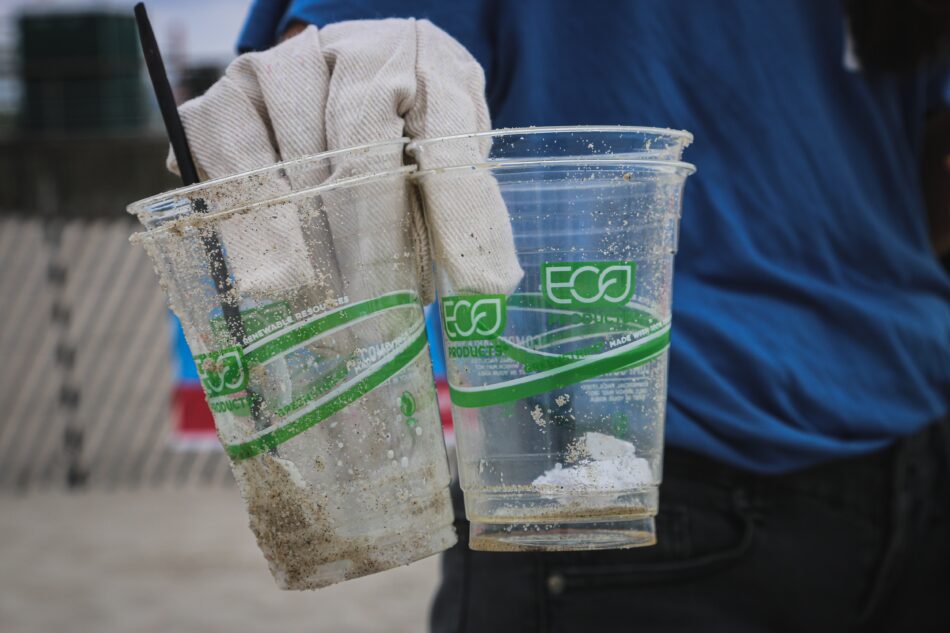Prepare Your Business for New Food Waste Legislation in the UK
From 31 March 2025, most UK businesses must arrange separate food waste collections. Learn and prepare for the new food waste legislation in the UK.

Compostable plastics are growing in popularity as a more sustainable option for packaging in various industries. Even though they’re designed to be biodegradable, it can still be tricky to understand how best to remove and dispose of such waste. You want to be environmentally conscious after all.
Compostable recycling for cups, bottles, and other products is possible but there are a few things you should know. Read on to learn how to dispose of compostable plastics, and what they can do for your garden.
Compostable plastics – sometimes referred to as bioplastics – are a type of plastic that’s biodegradable. They’re designed to be compostable and break down into water, biomass, and gases (carbon dioxide and methane) under specific and controlled environmental conditions. The temperature, moisture, and pH levels, alongside the oxygen and microorganisms present, affect whether they biodegrade.
While compostable plastics are biodegradable, not every biodegradable plastic is compostable. This is because soil and water are uncontrolled environments, so biodegrading times can vary, which means it can be misleading to refer to some bioplastics as compostable.
French researcher Maurice Lemoigne discovered the first biodegradable plastic polyhydroxybutyrate (PHB) in 1926, when working with the bacterium Bacillus megaterium. More recently, a teenager in Australia named Angelina Arora developed a new compostable plastic that decomposes 1.5 million times faster than commercial plastics.
She’s won multiple science and engineering awards because of her breakthrough, which removes the dangers of single-use plastics by converting them to more renewable resources.
Compostable plastics are made from different renewable materials such as corn and potato starch, soy protein, and lactic acid. Some are even created from prawn shells. Using organic rather than synthetic materials mean they decompose almost a million times faster than typical plastics made created from fossil fuels and petrochemicals.
Whichever material is used, it’s highly pressurised and then moulded into the shape required for the packaging. Once the product is consumed it can then be disposed of.
You can dispose of compostable plastic in a compost bin in most cases. Compostable plastic breaks down in soil and compost. However, this is only possible in temperatures above 50°C. As the plastics can break down in a microplastic free manner, the compost remains completely safe for works and other organisms to live in after the composting process is completed.
The composting process can take between two and four months in a compost bin. It depends on the temperature, water content, access from light and gas composition within the compost. After this, it can be used to fertilise your garden and help your plants grow.
One of the issues with compostable plastic waste is that it can still take a long time to break down. It may take up far more space in your compost bin than you want, which is an issue as your compost bin only has a limited volume.
Using lots of space on a large supply of compostable plastic can be something of a waste when there are plenty of old vegetables and fruit that can offer almost immediate nutrients to your compost.
Compostable plastics are effectively the alternative to traditional plastics, so finding further alternatives is tricky. As traditional plastics were leading to the deaths of marine life and the continued pollution of the planet, compostable plastics were developed to offer manufacturers an alternative that wouldn’t cause excessive damage to the world around us.
The only true alternative to compostable plastics is degradable plastics. However, these often lead to microplastic pollution, and can still take centuries to fully break down. Aside from paper, cardboard, and glass, compostable plastics is the best option for modern plastic packaging.
A few important facts about compostable plastics are that:
You can dispose of compostable plastics for free in any compost bin – at your home or business. There are no specific requirements or disposal needs. However, you will need the permission of the compost bin owner, as otherwise they may throw away any plastics on the assumption that they won’t turn to compost.
Find out more about other rubbish streams.
Get a fast FREE quote for your plastic waste
From 31 March 2025, most UK businesses must arrange separate food waste collections. Learn and prepare for the new food waste legislation in the UK.
The study participants included business owners and company employees, revealing unexpected findings about corporate environmental practices.